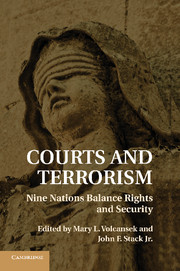Book contents
- Frontmatter
- Contents
- Contributors
- COURTS AND TERRORISM
- Introduction
- 1 Detentions and Security versus Liberty in Times of National Emergency
- 2 One More Casualty of the “War on Terror”
- 3 State Secrets and Democratic Values
- 4 What Lessons Can Be Drawn from a Sui Generis Case? The Global “War on Terror” and Northern Ireland
- 5 The British Experience with Terrorism: From the IRA to Al Qaeda
- 6 Detention and Treatment of Suspected Terrorists under the European Convention on Human Rights
- 7 Australia's Commonwealth Model and Terrorism
- 8 Judicial Rejection as Substantial Relief: The Israeli Supreme Court and the “War on Terror”
- 9 Preserving Rights and Protecting the Public: The Italian Experience
- 10 Squaring the Circle? Fighting Terror while Consolidating Democracy in Spain
- 11 From Exception to Normalcy: Law, the Judiciary, Civil Rights, and Terrorism in Colombia, 1984–2004
- Conclusion: Lessons Learned
- Cases Cited
- Statutes Cited
- References
- Index
10 - Squaring the Circle? Fighting Terror while Consolidating Democracy in Spain
Published online by Cambridge University Press: 05 July 2011
- Frontmatter
- Contents
- Contributors
- COURTS AND TERRORISM
- Introduction
- 1 Detentions and Security versus Liberty in Times of National Emergency
- 2 One More Casualty of the “War on Terror”
- 3 State Secrets and Democratic Values
- 4 What Lessons Can Be Drawn from a Sui Generis Case? The Global “War on Terror” and Northern Ireland
- 5 The British Experience with Terrorism: From the IRA to Al Qaeda
- 6 Detention and Treatment of Suspected Terrorists under the European Convention on Human Rights
- 7 Australia's Commonwealth Model and Terrorism
- 8 Judicial Rejection as Substantial Relief: The Israeli Supreme Court and the “War on Terror”
- 9 Preserving Rights and Protecting the Public: The Italian Experience
- 10 Squaring the Circle? Fighting Terror while Consolidating Democracy in Spain
- 11 From Exception to Normalcy: Law, the Judiciary, Civil Rights, and Terrorism in Colombia, 1984–2004
- Conclusion: Lessons Learned
- Cases Cited
- Statutes Cited
- References
- Index
Summary
During the morning rush hour on March 11, 2004, ten bombs exploded on four trains around the metropolitan area of Madrid. The ten bombs, as well as three others that did not explode, had been placed by a group of jihadist terrorists protesting Spain's participation in the war in Iraq. It was the largest terrorist attack ever perpetrated in Spain, leaving 191 dead and 1,800 injured. It was not, however, Spain's first experience with terrorism. Spaniards have lived with domestic terrorism for decades. Terrorist groups that appeared in the 1960s during Franco's dictatorial regime did not all die out with Franco's death. The Basque separatist group, ETA, has continued to be particularly active. This group resorts to terrorism in an attempt to force a declaration of independence for the Basque Country. The Basque Country has three provinces in northern Spain (four, say the most uncompromising, who also include Navarra) and three provinces in southern France, where ETA also operates; indeed France and Spain cooperate in the fight against ETA. ETA pursues the independence of all six (or seven) Basque provinces and the declaration of a Basque state independent from both Spain and France.
The persistence of terrorism posed a serious threat to Spain's new democracy, particularly during its earliest and most fragile years. Turning Spain into a democracy at the end of Franco's dictatorship was a delicate political operation that required a careful balancing of opposing political forces, those that demanded an immediate transition to democracy and those on the other side of the political spectrum that opposed any major political change.
- Type
- Chapter
- Information
- Courts and TerrorismNine Nations Balance Rights and Security, pp. 181 - 198Publisher: Cambridge University PressPrint publication year: 2010

